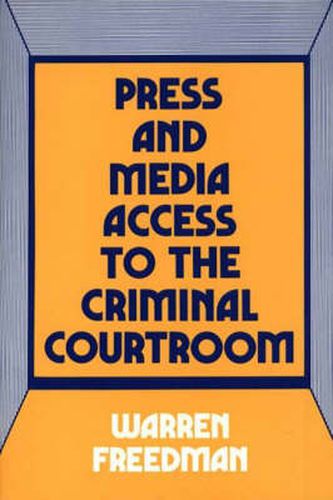Readings Newsletter
Become a Readings Member to make your shopping experience even easier.
Sign in or sign up for free!
You’re not far away from qualifying for FREE standard shipping within Australia
You’ve qualified for FREE standard shipping within Australia
The cart is loading…






To what extent should media coverage of criminal court proceedings be permitted? The central issue is how to strike a balance between the public’s right to information and the individual’s right to privacy. Freedman reviews the underlying legal principles and constitutional issues and describes important case law. He analyzes situations in which photographing, broadcasting, and televising in the courtroom are currently allowed and examines the relationship between the presence of media equipment during criminal trials and the actions of trial lawyers. The issue of media coverage as it relates to civil trials is also addressed, and British practices regarding press and media coverage of court proceedings are offered for comparison.
Legal Information Alert
Freedman here presents a comprehensive discussion of an issue of growing importance to both the legal profession and the communications industry: the extent to which media coverage of criminal court proceedings should be permitted. As Freedman points out, the central question is how to strike the appropriate balance between the public’s right to information and the individual’s right to privacy. In Press and Media Access to the Criminal Courtroom, he reviews the underlying legal principles and constitutional issues, describes the important cases that have shaped current legal thinking, and provides citations of the applicable case law.
$9.00 standard shipping within Australia
FREE standard shipping within Australia for orders over $100.00
Express & International shipping calculated at checkout
To what extent should media coverage of criminal court proceedings be permitted? The central issue is how to strike a balance between the public’s right to information and the individual’s right to privacy. Freedman reviews the underlying legal principles and constitutional issues and describes important case law. He analyzes situations in which photographing, broadcasting, and televising in the courtroom are currently allowed and examines the relationship between the presence of media equipment during criminal trials and the actions of trial lawyers. The issue of media coverage as it relates to civil trials is also addressed, and British practices regarding press and media coverage of court proceedings are offered for comparison.
Legal Information Alert
Freedman here presents a comprehensive discussion of an issue of growing importance to both the legal profession and the communications industry: the extent to which media coverage of criminal court proceedings should be permitted. As Freedman points out, the central question is how to strike the appropriate balance between the public’s right to information and the individual’s right to privacy. In Press and Media Access to the Criminal Courtroom, he reviews the underlying legal principles and constitutional issues, describes the important cases that have shaped current legal thinking, and provides citations of the applicable case law.